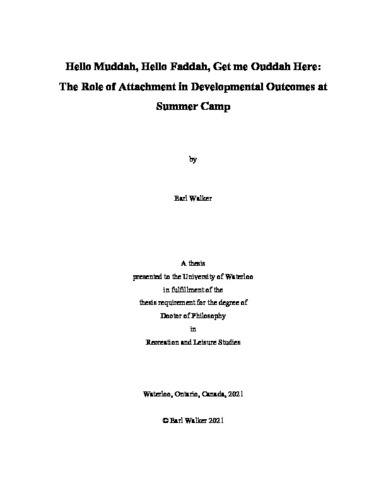| dc.description.abstract | From a psychosocial perspective this work examines the role of attachment (Bowlby, 1973; 1988) in the nature of developmental outcomes related to participation in residential summer camp in Canada. Attachment theory posits that early experience with primary caregivers leads to internal working models (i.e.: generalized beliefs and expectations) about the self, the world, and relationships, that come to shape psychosocial development later in life (Bowlby, 1973; 1988). As such, attachment has emerged as a fundamental topic in child and youth development (Bohlin et al., 2000). Summer camp is a unique social learning environment that is purposefully designed to foster positive youth development (Henderson et al., 2007; American Camp Association, 2011). Despite the importance of attachment for psychological development and the prevalence of summer camp as a youth service organization designed to foster youth development, no literature examining the role of attachment in the summer camp experience could be located. Thus, this study sought to explore how the working models that underpin attachment theory impact youth development in a summer camp setting. Data from Phase III of the Canadian Summer Camp Research Project, which utilized a post camp survey to examine parental perceptions of change in their child as a result of the camp experience was used. Phase III sought to explore if the skills developed during camp are transferable to other areas of the child daily life, and what the longer term consequences might be for the child’s overall wellbeing (Glover et al., 2011). Multiple liner regression modeling, bootstrapping based interaction modeling, and serial multiple mediation were used to examine how patterns of attachment (i.e.: attachment styles) based on the constructs of anxiety and avoidance (Bartholomew, 1990; Bartholomew & Horowitz, 1991), are associated with camp outcomes including exploration, self-efficacy, environmental engagement, physical activity, and the development of friendships and peer relations. It was found that attachment has a significant impact on developmental outcomes related to the summer camp experience. Attachment orientations are associated with the outcomes derived from camp participation, moreover this relationship was found to be partially meditated by connectedness to camp and levels of exploration. Further, it was found that highly anxious children who have relatively low levels of avoidance (i.e.: preoccupied avoidant attachment) actually derive the most benefit (i.e.: the greatest increases in the various outcomes) from camp participation. Applying attachment theory to the camp experience in this fashion has a number of implications with respect to positive youth development. First, the findings contribute a greater understanding of how positive youth development functions within a camp context. Second, they provide an understanding of some of the potential mechanisms that enable summer camp programs to delivers specific outcomes. Third, as diverse working models of attachment have a differential impact on developmental outcomes for different children they can assist camp programmers and administrators in being more intentional in their implementation of camp programs, to be more effectual and directed towards positive developmental outcomes. | en |

